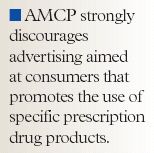- Safety & Recalls
- Regulatory Updates
- Drug Coverage
- COPD
- Cardiovascular
- Obstetrics-Gynecology & Women's Health
- Ophthalmology
- Clinical Pharmacology
- Pediatrics
- Urology
- Pharmacy
- Idiopathic Pulmonary Fibrosis
- Diabetes and Endocrinology
- Allergy, Immunology, and ENT
- Musculoskeletal/Rheumatology
- Respiratory
- Psychiatry and Behavioral Health
- Dermatology
- Oncology
AMCP Special Report: AMCP calls for changes that would strengthen FDA oversight of DTC advertising
Judith Cahill, executive director of the Academy of Managed Care Pharmacy (AMCP), gave testimony in early November during FDA's public hearing on direct-to-consumer advertising (DTC) of pharmaceutical products.
Judith Cahill, executive director of the Academy of Managed Care Pharmacy (AMCP), gave testimony in early November during FDA's public hearing on direct-to-consumer advertising (DTC) of pharmaceutical products.
Cahill's remarks included a call for changes that would result in a significantly improved and comprehensive program for FDA oversight of DTC advertising, which would include enforceable standards, pre-approval of advertising by FDA, and adequate funding to pursue these functions.
In her testimony, Cahill said that AMCP supports "advertising that increases public awareness about disease symptoms, informs consumers about available treatment options and diagnostic procedures that may be of benefit, stimulates discussions between prescribers and patients, and encourages people to pursue healthy lifestyles that can improve the health status of patients. It does this by encouraging consumers to become more proactive about their health in general, and by fostering constructive dialogue between patients and their providers regarding their care."

"Whether or not a prescription item is medically indicated for a given patient, DTC advertising of the product can create unwarranted patient demand," Cahill said. "The ads can often be misleading, failing to sufficiently warn consumers about the potential risks of using the product and about alternative treatment options."
Cahill also said that "current drug advertising frequently fails to warn consumers about potential risks of using a product, fails to reveal alternative treatment options, and fails to provide information about cost." In addition, the issue of DTC advertising has been raised as part of the drug safety debate, because of studies that conclude consumers who are subjected to a constant barrage of advertisements demand inappropriate prescriptions.
The complete testimony is available at http://www.amcp.org/
AMCP is a national professional association of pharmacists and other healthcare practitioners who serve society by the application of sound medication management principles and strategies to achieve positive patient outcomes. AMCP's 4,800 members develop and provide a diversified range of clinical, educational, and business management services and strategies on behalf of the more than 200 million Americans covered by a managed care pharmacy benefit.
Employers Face Barriers With Adopting Biosimilars
March 1st 2022Despite the promise of savings billions of dollars in the United States, adoption of biosimilars has been slow. A roundtable discussion among employers highlighted some of the barriers, including formulary design and drug pricing and rebates.
